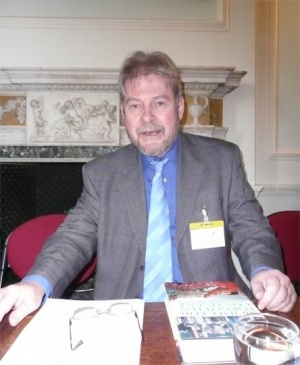Difference between revisions of "Michael Reid"
(reaction to launch of the book) |
(referenced comments) |
||
| Line 1: | Line 1: | ||
[[Image:MichaelReid.jpg|left|thumb|Michael Reid, Canning House, London, 2 November 2007]] | [[Image:MichaelReid.jpg|left|thumb|Michael Reid, Canning House, London, 2 November 2007]] | ||
| − | '''Michael Reid''' is the "Americas Editor" at The Economist magazine. Reid has reported for many years from Peru, Mexico and Brazil for the past 20 years. While previously a far-lefty who purportedly went to Bolivia for ideological reasons, he is presently in the "neoliberal camp". He is an associate of [[James Dunkerley]] and [[Lord Brennan]]. | + | '''Michael Reid''' is the "Americas Editor" at The Economist magazine. Reid has reported for many years from Peru, Mexico and Brazil for the past 20 years. While previously a far-lefty who purportedly went to Bolivia for ideological reasons, he is presently in the "neoliberal camp"<ref>This fact was related by James Dunkerley during his comments at the Reid's book launch at Canning House, London, 2 November 2007.</ref>. He is an associate of [[James Dunkerley]] and [[Lord Brennan]]. |
==Book Launch== | ==Book Launch== | ||
| − | On 2 November 2007, Reid's book was launched to much fanfare at Canning House in London. Many diplomats, foreign office officials, investment bankers, financial analysts, risk analysts and a sprinkling of academics were present. Reid's new book presents a history of Latin America which is critical of the "dependency theory analysts", suggests that the best model for Latin America is a mixture of liberal democracy and neoliberal economics, and also is highly critical of developments in Venezuela which are termed populist. The broad overt approval of the book among the senior foreign office operatives and foreign diplomats (they were seated in the front row), suggests that this is the dominant policy framework among the foreign policy elite. | + | On 2 November 2007, Reid's book was launched to much fanfare at Canning House in London. Many diplomats, foreign office officials, investment bankers, financial analysts, risk analysts and a sprinkling of academics were present. Reid's new book presents a history of Latin America which is critical of the "dependency theory analysts", suggests that the best model for Latin America is a mixture of liberal democracy and neoliberal economics, and also is highly critical of developments in Venezuela which are termed populist. The broad overt approval of the book among the senior foreign office operatives and foreign diplomats (they were seated in the front row), suggests that this is the dominant policy framework among the foreign policy elite.<ref>Observations and comment by Paul de Rooij who sat in the second row behind the Foreign Office senior operatives and the ambassador of the Dominican Republic.</ref> |
==References, Resources and Contact== | ==References, Resources and Contact== | ||
===Publications=== | ===Publications=== | ||
*Michael Reid, ''Forgotten Continent'': The Battle for Latin America's Soul, Yale Univ. Press, Nov. 2007. | *Michael Reid, ''Forgotten Continent'': The Battle for Latin America's Soul, Yale Univ. Press, Nov. 2007. | ||
Revision as of 11:15, 4 November 2007
Michael Reid is the "Americas Editor" at The Economist magazine. Reid has reported for many years from Peru, Mexico and Brazil for the past 20 years. While previously a far-lefty who purportedly went to Bolivia for ideological reasons, he is presently in the "neoliberal camp"[1]. He is an associate of James Dunkerley and Lord Brennan.
Book Launch
On 2 November 2007, Reid's book was launched to much fanfare at Canning House in London. Many diplomats, foreign office officials, investment bankers, financial analysts, risk analysts and a sprinkling of academics were present. Reid's new book presents a history of Latin America which is critical of the "dependency theory analysts", suggests that the best model for Latin America is a mixture of liberal democracy and neoliberal economics, and also is highly critical of developments in Venezuela which are termed populist. The broad overt approval of the book among the senior foreign office operatives and foreign diplomats (they were seated in the front row), suggests that this is the dominant policy framework among the foreign policy elite.[2]
References, Resources and Contact
Publications
- Michael Reid, Forgotten Continent: The Battle for Latin America's Soul, Yale Univ. Press, Nov. 2007.
